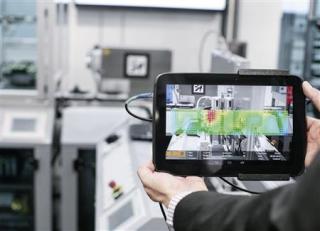Nov 26 2015
From sensors to mechanical drives and control components, Festo offers a complete spectrum of products for electric automation, as well as developing full system solutions. The company’s aim going forward is to build on its successful growth in the area of electric automation. One aspect of this will take the shape of innovative products for the factory of the future.
Festo will be at SPS IPC Drives – Hall 9, stand 361 – presenting the automation platform CPX and the flexible multi-carrier system, as well as a research project: the parallel kinematic system with CPX/EMCA, a robot control system incorporating numerous features of Industry 4.0. In addition, Festo Didactic will be presenting training solutions for Industry 4.0. The eMotionButterflies developed by the Bionic Learning Network will provide a glimpse of the networked production of the future. And the final innovation Festo will be presenting at SPS IPC Drives is the SupraCarrier, an innovative application for superconductor technology.
 Festo Pressebild Industrie 4.0 In der Produktion der Zukunft ist Vernetzung allgegenwärtig; reale und virtuelle Welt wachsen zusammen.
Festo Pressebild Industrie 4.0 In der Produktion der Zukunft ist Vernetzung allgegenwärtig; reale und virtuelle Welt wachsen zusammen.
Electric automation at Festo
In addition to its expertise in pneumatic drive technology, for 20 years Festo has also been running a very successful operation in the field of electric automation and has set itself ambitious growth targets for this business area. “Last year, growth in the business area of Electric Automation was yet again well into double digits. We want to continue to build on this upward trend. The recipe for success is to have an extensive product range and to continue to expand that range. From sensors to electric drives to control components and software, we cover every level of automation, as well as offering full system solutions,” explained Martin Schorbach, Head of Business Development Electric Automation.
“Festo is also actively pressing ahead with the implementation of Industry 4.0 in electric automation. We have successfully positioned some significant innovations in electric drives on the market. The first step on the path to Industry 4.0 is the universal communication interface OPC-UA. Festo has incorporated this interface into its innovative automation solutions such as the automation platform CPX, the multi-carrier system – a flexible transport system, and its research project, the parallel kinematic system with CPX/EMCA. This makes it possible for these solutions to be integrated quickly and easily into existing installations and process control systems,” noted Dr Ansgar Kriwet, Member of the Management Board Sales at Festo AG.
Industry 4.0 for flexibility and productivity
In future, digitalisation will lead to fully networked communication within plants and systems, resulting in countless benefits for the system manufacturer and its customers. On the one hand, there will be a horizontal integration between the company, its suppliers and customers. This will ensure increased productivity along the entire value chain.
On the other hand, vertical integration within production will make it possible for intelligent components with their own control systems to communicate with each other and organise themselves. “This will enable systems to be changed as needed in a time- and cost-efficient manner, without complex reprogramming. This will increase productivity and flexibility, and fit with the trend for customised products,” explained Dr Kriwet at the press breakfast held by Festo AG.
One goal of research and development work in the context of Industry 4.0 is the integrated engineering of machines and systems. “Digital networking will simplify the collaboration between customers, research, development and production, as well as the subsequent commissioning and maintenance of the system,” Dr Kriwet added.
Industry 4.0 at Festo – technology, people and education in harmony
Festo sees Industry 4.0 from a range of viewpoints. Owing to the fusion of modern information and communication technologies with conventional industrial processes, there is an emphasis on the technology. “Together with its partners from business, academia and politics, Festo is pursuing targeted research collaborations and joint projects to develop technologies for the production of the future,” explained Dr Kriwet.
Alongside technology, Festo is focusing on the role of people in the production environment of the future, and researching how people and machines can work together safely. One example of this is robots that interact with people without the need for a protective cage.
For Festo, another key aspect of Industry 4.0 is the training and qualification of employees, who need to be prepared to take on new and considerably more complex tasks. Festo employees receive appropriate ongoing training: thanks to Festo Didactic SE, the global leader in the provision of technical education, the company is ideally equipped for the basic and further training of its employees.
Festo will also be at stand 440 in the special Industry 4.0 exhibition area in Hall 3A, presenting Didactic’s learning factory.